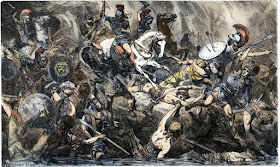 |
| A Dream of Ancient Athens Sydney Herbert source ArtUK |
History of the Peloponnesian War
 |
| Athenian navy, Sicily source Wikimedia Commons |
Book VII: Gylippus has great success in Syracuse, turning the tide of
the war in favour of the Sicilians, capturing outposts and generally making a great
nuisance of himself. Nicias is ill
with a kidney condition and writes to Athens to send more armaments, as
Alcibiades has turned traitor, Lamachus is dead and he is the only general
left. They immediately send
Eurymedon with ten ships which is hardly encouraging, and Demosthenes sets to
gather more reinforcements to leave in the spring. Meanwhile Gylippus prods the Syracusans to engage the
Athenians in a sea battle and although they lose, he is able to capture three
forts with loads of supplies and this feat is labeled “the first and foremost
cause of the ruin of the Athenian army”.
Athenians ships fail to stop other Spartan ships from leaving
Peloponnese and an Athenian supply vessel is destroyed, further damaging the Athenian cause, and with a
Spartan invasion at Decclea, a second war front springs up for the beleaguered
Athenians. Thucydides relates
complete disbelief that, in spite of all they had suffered and the emerging war
on the home front, they still stubbornly clung to their Sicilian
expedition.
 |
| Destruction of the Athenian army at Syracuse source Wikimedia Commons |
Demosthenes and Eurymedon arrive and Demosthenes pushes for
immediate attack, feeling that Nicias missed his chance for victory with
procrastination at the outset. His
attack fails and he counsels for immediate withdrawal as the troops with have
more use at Athens. Nicias
disagrees with his counterpart.
NOW, in spite of never being in favour of the expedition, he wants to
remain, citing information that the Syracusans are running out of money and his confidence in his fleet. The two
argue but when Gylippus returns, they all agree to leave, however an eclipse of
the moon stays their departure and Nicias “who was somewhat over-addicted to
divination and practices of that kind,” refuses to depart. It is an unwise decision as Eurymedon
is killed in battle and the Syracusans surround the whole Athenian fleet in the
Great Harbour. The Athenians with
their whole fleet attempt to fight their way out, but are routed. They retire and both Demosthenes and
Nicias wish to try again the next day but the soldiers are demoralized and
refuse to man the ships so they plan their escape route overland. Exhausted, the army encounters
opposition wherever they go and eventually are killed or captured, with very
few escaping. Both Demosthenes and
Nicias surrender and are chopped to bits; Thucydides stresses that Nicias did
not deserve this fate. The losses
for Athens are the most catastrophic imaginable.
 |
| Destruction of the Athenian army in Sicily source Wikimedia Commons |
No comments:
Post a Comment